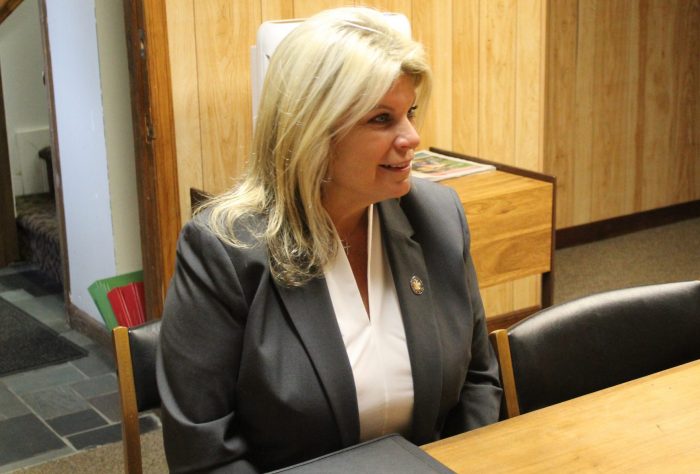Giglio seeks reelection for NY Assembly District 2
In New York’s 2nd Assembly District race, incumbent state Assemblywoman Jodi Giglio (R-Riverhead) faces Democratic Party challenger Wendy Hamberger, a lawyer, who could not be reached for comment on this story.
This year’s Assembly district boundaries have changed due to redistricting. While losing Southold in its entirety, the 2nd District has picked up all of Mount Sinai, some of Port Jefferson Station — including its Train Car Park — and a small part of Port Jefferson.
Before entering politics, Giglio was a private business owner. After co-founding the Riverhead Business Alliance, she ran successfully for the Riverhead Town Board. She is completing her first term in the state Assembly.
Giglio says her professional background has guided her work in government. “I’m a proponent of property rights,” she said. “I’m a capitalist. I believe that if people are making money, then they’re able to pay the salaries and keep people employed.” She added, “I have experience in having payroll and knowing what it costs to pay those bills … I feel that I have life experience in having my own business.”
‘I believe that if people are making money, then they’re able to pay the salaries and keep people employed.’
— Jodi Giglio
Giglio was asked how to properly balance the need to build adequate housing with preserving open space. She advocates finding a proper mix of both.
“We’ve done our fair share as far as farmland preservation, as you see the vistas when you’re traveling through my district,” she said, adding, “There definitely is a housing crisis, but the costs of the apartments that the government is subsidizing are so much greater than if it was the private sector creating these opportunities.”
Giglio believes there are too many incentives to go through the government to support new housing, which she says can drive up building costs exponentially.
“It’s almost an incentive to get the low-income tax credits from HUD [U.S. Department of Housing and Urban Development] to get subsidized and to inflate the cost of the project,” the assemblywoman said. “You’re not incentivizing people to break free from the government.”
At the same time, the state is confronting how to handle its population of undocumented immigrants. When asked if there is a way to curate these individuals to make jobs accessible to them, Giglio supported expanding the H-2A visa program.
“There should be a computer portal where they can go online and say, ‘I want to work here in the United States. These are my skills,’” she said, adding, “As a member of the [Assembly] Labor Committee, I would support that.”
She also said that due to state regulations, New York has created an uncompetitive marketplace for agricultural workers.
Referring to migrant workers, she observed: “They’re leaving New York state, and they’re going to New Jersey, to Connecticut, to Pennsylvania to work because they can work 100 hours a week and they can make top pay to send back to their countries whereas New York has limited them.”
On the topic of the MTA-LIRR, Giglio favored the electrification of the rail. “Our main infrastructure needs to be electrified,” she said.
To reform the railroad, she believes the state government should address public safety concerns within public transportation, adding, “A lot of people are afraid to take the Long Island Rail Road, myself included. I drive in [to the city] now.”
Tying into this issue is the question of rising homelessness throughout the area. To reform these deeply rooted social problems, Giglio favors an aggressive push toward addressing the mental health crisis.
“We need to really pay attention to mental health,” she said. “Mental health exists, and a lot of people need our help.”
One of Giglio’s central policy concerns centers around declining trust in law enforcement. According to her, rebuilding confidence in the police department starts early.
“We need to encourage kids that want a career in law enforcement, and that is the only way we can establish trust,” she said. “We need to ensure that we have a more diverse police department, which starts in the high schools.”
In bolstering economic growth and supporting young families moving into the area, Giglio also proposed ways to remediate Long Island’s affordability crisis, focusing on promoting the technology sector.
“Keeping people here on Long Island is really [about] drawing in Silicon Valley,” she said. “Bringing in companies to make electric batteries, coming up with new designs, 3D printing and robotics, that’s the stuff we need. We need to be the hub for that here on Long Island.”
Giglio said she wants to continue growing the manufacturing sector on Long Island, as these jobs often offer higher starting pay and a better standard of living.
“Those types of jobs, where they’re starting out at $25 or $35 an hour, are the types of jobs we need,” she said.
Discussing the future of nuclear energy on Long Island, she expressed reservations, particularly concerning public safety. However, the decommissioned Shoreham Nuclear Power Plant is located in her district, and she supports using that property in some capacity.
“We might as well make good use of it, whether it’s as a parking lot for people to use the beach or a dock for people to launch off of or something benign,” she said.
Moving on to the topic of infrastructure, she expressed irritation over Long Island’s roadways, which she considered widely in disrepair due to overuse.
“The number of trucks that come in and out of Long Island to deliver material and supplies … I think our roads see a lot of disrepair because of that,” she said.
She took issue particularly with past planning of the Long Island Expressway, which she regarded as shortsighted. “It was a mistake to do the Long Island Expressway in asphalt,” she said. “It should have been done in concrete, which costs a little more money but would have lasted a lot longer.”
In addition to failed infrastructure planning, she sees the lack of reliable waste disposal options as a cause for concern. “We’re going to have a garbage crisis on Long Island,” she said. “We need to find new markets. That’s another one of my priorities, finding new markets for recyclables.”
In an age of increasing polarization, Giglio said she has tried to conduct herself respectfully. She condemned the practice of legislators dismissing one another out of hand.
“I think that happens too often in politics where people are just dismissed because they can, because they have power,” she said. “I see it happen every day in Albany.”
To reform this culture of division, Giglio said she has made a concerted effort while in office to reach out to her colleagues across the aisle: “I voted ‘yes’ for the reparations commission,” she said. “I was the only one in the Republican Party that voted ‘yes,’ and I did it because I want to know what they’re feeling. I want to learn what they’re feeling.”
Elaborating on her position, she added, “You can’t get to the root of a problem until you understand the feelings of where it’s coming from.”
Giglio’s reelection for another term in office depends on the will of the voters, who will go to the polls on Tuesday, Nov. 8.







